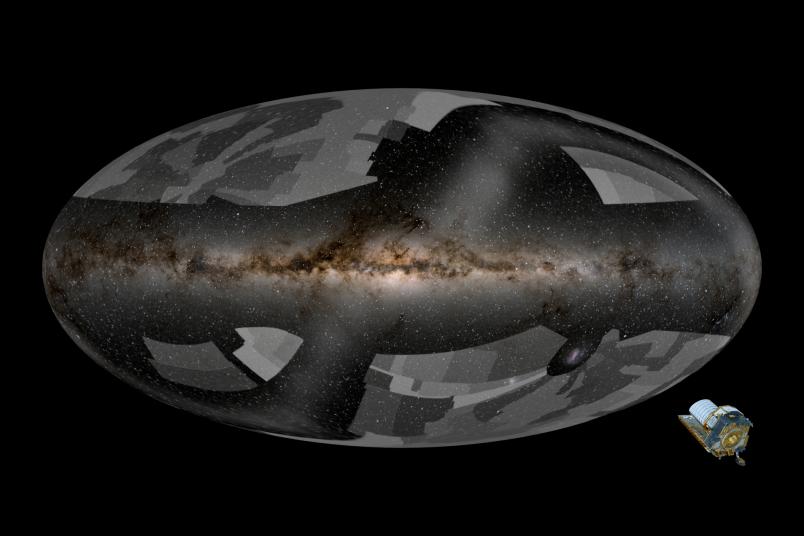
Cosmology
Euclid space telescope successfully launched into space
German research institutes are participating at the forefront of dark matter and dark energy research – among them is Ruhr University Bochum.
Euclid, a space telescope of the European Space Agency ESA with strong German participation, was launched into space on 1 July 2023, at 17.11 CEST on a Falcon 9 rocket from the US space company SpaceX. From its destination, the Lagrange Point 2 of the Earth and the Sun, it will observe over a third of the entire sky for at least six years and map the spatial distribution of several billion galaxies. With the data, the six institutes of the international Euclid consortium participating from Germany hope to gain insight into the influence of dark matter and dark energy on the structure of the Universe. Professor Hendrik Hildebrandt, cosmologist at Ruhr University Bochum, has been a Euclid member for many years.
Dark matter and dark energy
“We are absolutely thrilled because Euclid represents a quantum leap in humankind’s ability to study the origin and evolution of the Universe,” says Joseph Mohr from Ludwig Maximilian University (LMU) in Munich. LMU is one of the six German research institutes involved in Euclid and contributed vital components.
For the first time, Euclid will systematically investigate the influence of dark matter and dark energy on the evolution and large-scale structure of the Universe. These largely unknown and invisible components of the Universe together account for 95 per cent of the cosmos. While dark matter determines gravity effects between and within galaxies and initially caused the expansion of the Universe to slow down, dark energy is responsible for the current accelerated growth of the Universe. Jochen Weller (LMU/Max Planck Institute for Extraterrestrial Physics) is enthusiastic: “Euclid will enable us to test Einstein’s theory of gravity at large distances, and who knows – maybe we need to extend his theory.”
Scientific observations starting in autumn 2023
Euclid is a space mission of ESA with contributions from the National Aeronautics and Space Administration (NASA). Almost exactly eleven years after ESA officially adopted this programme, hundreds of Euclid Consortium scientists around the world are now eagerly awaiting the telescope’s arrival at the Lagrange Point 2 of the Earth and Sun, from where it will begin scientific observations in autumn 2023. The space telescope is named after the famous mathematician Euclid of Alexandria, who supposedly lived and worked during the 3rd century BC.
The consortium brings together scientists and engineers from 17 countries, many from Europe, but also from the USA, Canada and Japan. It is responsible for the development and construction of the instrumentation, for the collection of all complementary data on the ground, for the development of the survey strategy and the data processing pipeline to produce all calibrated images and catalogues, and for the scientific use of the data. It is managed by the Institut d’astrophysique de Paris in France. The companies Thales Alenia Space and Astrium are responsible for constructing the telescope, whose primary mirror has a diameter of 1.2 metres.
German collaborators
In Germany, the Euclid mission was jointly initiated and developed by the Max Planck Institute for Astronomy (MPIA) in Heidelberg, the Max Planck Institute for Extraterrestrial Physics (MPE) in Garching, LMU in Munich and the University of Bonn (UB) with support of the German Space Agency at the German Aerospace Center (DLR). Euclid founding members Ralf Bender (LMU/MPE), Hans-Walter Rix (MPIA), Peter Schneider (UB) and Jochen Weller (LMU/MPE) were involved in key positions. Ruhr University Bochum joined in 2018.

MPE and MPIA contributed key components to Euclid’s optics. MPE operates the German Euclid Science Data Center; MPIA, LMU, UB, and Ruhr University developed essential software elements for calibrating and analysing Euclid data. “To determine the distribution of matter in space, researchers have to measure the distance of all galaxies to Earth,” explains Bochum researcher Hendrik Hildebrandt. “This is done by combining satellite data from Euclid with data from ground-based telescopes.”
The UB hosts the Euclid Publication Office, where the scientific publications of the Euclid consortium are coordinated and reviewed. Peter Schneider (UB) is certain: “We expect a very large number of groundbreaking publications, not only in cosmology but in almost all research areas of astrophysics.” All institutions contributed to the development of science exploitation and participated in the Euclid Science Working Groups.
In addition to the scientific questions Euclid investigates, the technology used is also cutting-edge. Frank Grupp (MPE/LMU) underlines: “Euclid contains the largest optical lenses ever developed for a scientific space mission. It was a real challenge, and we are very grateful for the support of the German Space Agency at DLR for this extraordinary mission.” The German Space Agency at DLR coordinates the German ESA contributions and also provides funding of 60 million euros from the National Space Programme for the participating German research institutes.
“We are all very happy about the successful launch,” says Hans-Walter Rix (MPIA). “Now we have many years of intensive work with exciting results ahead of us. We hope we will eventually have a significantly improved view of the Universe.”